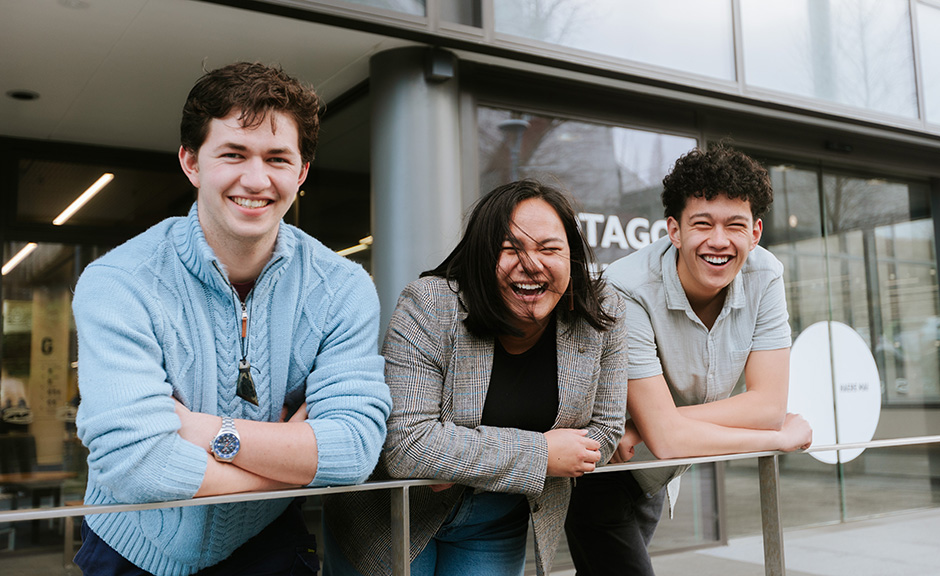
Lachlan Williams, Te Pou-tūā-rongo (Vice-President), Kaya Tanoa-Kaivananga, Te Pou-toko-manawa (President) Dillique Brown, Te Pou Rēhia (Events).
Can you tell us about TTT and some of its goals?
TTT supports Māori tauira studying towards a commerce degree. Academically, we have textbooks for core papers and host fortnightly study nights and study days before the exam period with drop-in sessions from the core paper lecturers.
Socially, we work with Pasifika student associations, ngā rōpū and Te Maea. Te Maea facilitates two programs, Te Manawa Tītī, a program for Māori business leaders to develop cultural and business leadership skills, and Te Matatū, a personal leadership development opportunity to enrich our tauira with knowledge and skills for the business or Māori world.
Our main goal has always been to be present and awhina (support) our tauira; whether one or many, as long as we can help one, that makes all the difference.
How did you become involved in TTT , and what does your role involve?
The Māori Centre referred me and I became involved in TTT during my first year in 2021 because I was flatting and looking for more academic support. After following TTT on Facebook, I saw they would host study nights with food, and my friends and I would all go because we took the same papers and studied together.
When I think of my role, I think of my title within the rōpū, Te Pou-toko-manawa. The first pou (post) you see when you enter the marae are the heart and the face. That means advocating for our tauira through representation. I try my best to attend as much kaupapa as possible relevant to Māori, a bonus if it is commerce related.
Other than being the face, as any leader, I set the standard and āhuatanga of the rōpū, so I prioritise learning and speaking te reo Māori and being competent in tikanga Māori. For me, our reo and our culture are the pillars that make me Māori.
But my purpose is to give and always serve our people; that is what I do and who I was long before this role. I aspire to be that pou to whakamana others so they can be as confident as I am in my Māoritanga, if not more.
What are you studying, and what are your career plans?
I am pursuing a Bachelor of Arts and Commerce conjoint degree in Indigenous Studies and Management. I have a vague idea regarding career plans, but I am strongly called to a role that helps others. Especially Māori and Pasifika, because I share that whakapapa and I want to help our people thrive.
How do students join TTT , and what kind of meetings, events and other support does TTT provide?
If you whakapapa Māori and are enrolled as Māori pursuing a commerce degree. You are already part of the rōpū, so nau mai!
As mentioned, our events are places to study with kai provided and to socialise with other tauira Māori, from there you will get invited to be part of Te Manawa Tītī or Te Matatū.
We have been holding study nights on Mondays from 6–8pm down in G.01 (the TTT room) because it’s a relaxed space to share kai, and then we use G.02 as a study space because of the kawa.
What advice would you give someone thinking about joining TTT ?
In your own time, when you are ready, the mauri of Te Tai Tuarā will be waiting to welcome you on your te ao Māori journey.
Kaua e whakamā, (meaning don’t be shy), is easier said than done. But I can empathise with tauira Māori, who might feel they aren’t “Māori enough” because they don’t know the reo or the culture. E pai tēnā, I was in that position once and felt like that for a long time, and I still feel that now and again. However, that does not make us any less Māori.
A teina (younger sister/cousin) from the East Coast once told me, “You are only as much Māori as you say you are”. As long as you have whakapapa, you are Māori, which is enough. The rest will come later if you decide to pursue that journey.
It is a lifelong journey that our tūpuna (ancestors) made possible for us, so when you walk this path, know they walk with you too.
Kōrero by Communications Adviser, Sally Knox.
